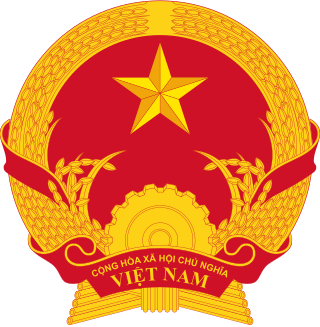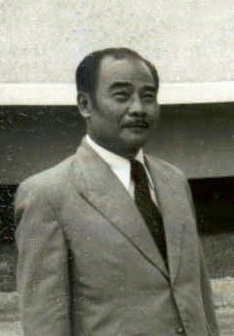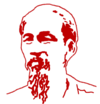Marxism–Leninism is a communist ideology that became the largest faction of the communist movement in the world in the years following the October Revolution. It was the predominant ideology of most communist governments throughout the 20th century. It was developed by Joseph Stalin and drew on elements of Bolshevism, orthodox Marxism, and Leninism. It was the state ideology of the Soviet Union, Soviet satellite states in the Eastern Bloc, and various countries in the Non-Aligned Movement and Third World during the Cold War, as well as the Communist International after Bolshevization.

The politics of Vietnam is dominated by a single party under an authoritarian system, the Communist Party of Vietnam (CPV). The President of Vietnam is the head of state, and the Prime Minister of Vietnam is the head of government. Both of these offices are separate from the General Secretary of the Communist Party of Vietnam, who leads the CPV and is head of the Politburo and the Central Military Commission. The General Secretary is thus the de facto supreme leader of Vietnam. Executive power is exercised by the government and the President of Vietnam. Legislative power is vested in the National Assembly of Vietnam. The Judiciary is independent of the executive. The parliament adopted the current Constitution of Vietnam, Vietnam's fifth, on 28 November 2013.

Hồ Chí Minh, colloquially known as Uncle Ho or just Uncle (Bác), and by other aliases and sobriquets, was a Vietnamese communist revolutionary, nationalist, and politician. He served as prime minister of the Democratic Republic of Vietnam from 1945 to 1955 and as president from 1945 until his death in 1969. Ideologically a Marxist–Leninist, he was the Chairman and First Secretary of the Workers' Party of Vietnam, the predecessor of the current Communist Party of Vietnam.

Prince Souphanouvong, nicknamed the Red Prince, was along with his half-brother Prince Souvanna Phouma and Prince Boun Oum of Champasak, one of the "Three Princes" who represented respectively the communist (pro-Vietnam), neutralist and royalist political factions in Laos. He was the President of Laos from December 1975 to October 1986.

The Communist Party of Vietnam (CPV), also known as the Vietnamese Communist Party (VCP), is the founding and sole legal party of the Socialist Republic of Vietnam. Founded in 1930 by Hồ Chí Minh, the CPV became the ruling party of North Vietnam in 1954 and then all of Vietnam after the collapse of the South Vietnamese government following the Fall of Saigon in 1975. Although it nominally exists alongside the Vietnamese Fatherland Front, it maintains a unitary government and has centralized control over the state, military, and media. The supremacy of the CPV is guaranteed by Article 4 of the national constitution. The Vietnamese public generally refer to the CPV as simply "the Party" or "our Party".

Trường Chinh was a Vietnamese communist political leader, revolutionary and theoretician. He was one of the key figures of Vietnamese politics and the important Vietnamese leaders for over 40 years. He played a major role in the anti-French colonialism movement and finally after decades of protracted war in Vietnam, the Vietnamese defeated the colonial power. He was the think-tank of the Communist Party who determined the direction of the communist movement, particularly in the anti-French colonialism movement. After the declaration of independence in September 1945, Trường Chinh played an important role in shaping the politics of the Democratic Republic of Vietnam (DRV) and creating the socialist structure of the new Vietnam.
Tố Hữu was a Vietnamese revolutionary poet and politician. Tố Hữu is considered one of the most important Vietnamese poets of the 20th century. His poems are known for their lyrical beauty, their political engagement, and their insights into the Vietnamese people. Tố Hữu's poetry is a valuable record of the Vietnamese revolution and the Vietnamese people's struggle for independence. His poems are also a testament to the power of poetry to inspire and to give voice to the oppressed. He published seven collections of poems, the first of which was the 1946 collection entitled Từ ấy (Thenceforth), which included many of his most popular and influential works that were written between 1937 and 1946. Following the establishment of the Democratic Republic of Vietnam, he became a prominent figure in the ruling Communist Party of Vietnam.

Trotskyism in Vietnam was represented by those who, in left opposition to the Indochinese Communist Party (ICP) of Nguyen Ai Quoc, identified with the call by Leon Trotsky to re-found "vanguard parties of proletariat" on principles of "proletarian internationalism" and of "permanent revolution". Active in the 1930s in organising the Saigon waterfront, industry and transport, Trotskyists presented a significant challenge to the Moscow-aligned party in Cochinchina. Following the September 1945 Saigon uprising against the restoration of French colonial rule, Vietnamese Trotskyists were systematically hunted down and eliminated by both the French Sûreté and the Communist-front Viet Minh.
National communism is a term describing various forms in which Marxism–Leninism and socialism has been adopted and/or implemented by leaders in different countries using aspects of nationalism or national identity to form a policy independent from communist internationalism. National communism has been used to describe movements and governments that have sought to form a distinctly unique variant of communism based upon distinct national characteristics and circumstances, rather than following policies set by other socialist states, such as the Soviet Union.

The Ho Chi Minh Museum is located in Hanoi, Vietnam. Constructed in the 1990s, it is dedicated to the late Vietnamese leader Ho Chi Minh and Vietnam's revolutionary struggle against foreign powers.
Anarchism in Vietnam first emerged in the early 20th century, as the Vietnamese started to fight against the French colonial government along with the puppet feudal dynasty for either independence or higher autonomy. Some famous radical figures such as Phan Bội Châu and Nguyễn An Ninh became exposed to strands of anarchism in Japan, China, and France. Anarchism reached its apex in Vietnam during the 1920s, but it soon began to lose its influence with the introduction of Marxism-Leninism and the beginning of the Vietnamese communist movement. In recent years, Anarchism in Vietnam has attracted new adherents.
Marxism is a method of socioeconomic analysis that originates in the works of 19th century German philosophers Karl Marx and Friedrich Engels. Marxism analyzes and critiques the development of class society and especially of capitalism as well as the role of class struggles in systemic, economic, social and political change. It frames capitalism through a paradigm of exploitation and analyzes class relations and social conflict using a materialist interpretation of historical development – materialist in the sense that the politics and ideas of an epoch are determined by the way in which material production is carried on.
Socialist patriotism is a form of patriotism promoted by Marxist–Leninist movements. Socialist patriotism promotes people living within Marxist–Leninist countries to adopt a "boundless love for the socialist homeland, a commitment to the revolutionary transformation of society [and] the cause of communism". Marxist–Leninists claim that socialist patriotism is not connected with nationalism, as Marxists and Marxist–Leninists denounce nationalism as a bourgeois ideology developed under capitalism that sets workers against each other. Socialist patriotism is commonly advocated directly alongside proletarian internationalism, with communist parties regarding the two concepts as compatible with each other. The concept has been attributed by Soviet writers to Karl Marx and Vladimir Lenin.
The New Vietnam Revolutionary Party or Revolutionary Party of the New Vietnam 1925–1930, was a non-communist revolutionary party in Vietnam's early independence movement founded by Nguyễn Thị Minh Khai.
Ho Chi Minh Thought is a political philosophy that builds upon Marxism–Leninism and the ideology of Vietnamese revolutionary Ho Chi Minh. It was developed and codified by the Communist Party of Vietnam and formalised in 1991. The term is used to cover political theories and policies considered as representing a form of Marxism–Leninism that has been adapted to Vietnamese circumstances and history. The ideology includes views on the basic issues of the Vietnamese Revolution, specifically the development and application of Marxism–Leninism to the material conditions of Vietnam.
The Academy of Journalism and Communication is an academy with its campus in Hanoi, Vietnam. The academy was established in 1962 and now it is under the Ho Chi Minh National Academy of Politics and Public Administration. Main tasks of the academy are training bachelors and masters of Marxism – Leninism politics, Ho Chi Minh Thoughts subjects, officers of Thought – Culture, Press and Media. There are over 255 teachers, researchers in academy, including 9 professors and associate professors, 152 Ph.Ds and Masters and 95 main teachers.
Criticism and self-criticism is a philosophical and political concept developed within the ideology of Marxism–Leninism and Maoism. The concept would be a major component of the political philosophy of Chinese Marxist leader Mao Zedong.
Socialism in Vietnam, in particular Marxism–Leninism, is the ideological foundation of the Communist Party of Vietnam (CPV) for the development of the country ever since its establishment.

Kaysone Phomvihane Thought is a political ideology that builds upon Marxism–Leninism and Ho Chi Minh Thought with the political philosophy developed by Kaysone Phomvihane, the first leader of the Communist Lao People's Revolutionary Party (LPRP). It was first formalised by the LPRP at its 10th National Congress, held in 2016. The ideology includes views on the basic issues of the Laotian Revolution, specifically the application and development of Marxism–Leninism to the material conditions of Laos. The contents of Kaysone Phomvihane Thought was codified and developed by the LPRP with help from the Communist Party of Vietnam.










